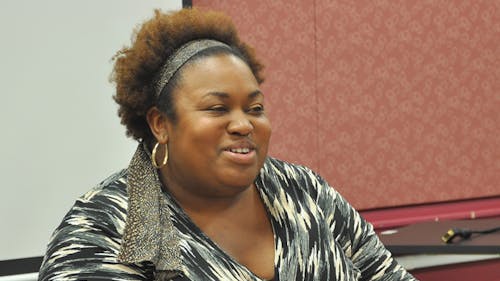Professor, author introduces book about black feminism

Brittney Cooper became a feminist after falling in love with studying 19th century black women.
Brittany Hall introduced Cooper, who spoke yesterday as a part of the fifth annual Interpreting American History lecture series in Van Dyck Hall on the College Avenue campus, as a “dynamic and thought-provoking” speaker.
Cooper, an assistant professor of Women’s and Gender Studies and Africana Studies at Rutgers, presented a piece from her book, “Race Women: Gender and the Making of a Black Public Intellectual Tradition, 1892-Present,” which she is currently revising. When initially pitching the book, Cooper said she wanted to write a “kind of intellectual history” of a specific group of black female thinkers.
“It’s recuperating important 19th century black women intellectuals and arguing that we have overlooked their thought in contemporary scholarship,” Cooper said.
These women had important things to say about what racial freedom struggles were about, said Cooper, and that their thoughts and opinions are important for how black feminist theory is looked at and taught today.
Cooper wants to see these women taken for the serious theorists and civil rights activists they were, she said.
Hall, a Ph.D. student in the Department of History at Rutgers, said Cooper’s work navigates the at-times contentious realms of history and theory, feminism and racial justice and explored questions of sexuality, feminism, race and gender politics.
Cooper is frequently featured as a commentator on shows like “The Melissa Harris-Perry Show” and “All In with Chris Hayes,” Hall said.
When Cooper was an undergraduate student at Howard University, she did not learn the works of Mary Church Terrell or Pauli Murray, two 19th century women’s rights activists, among other important black feminists.
Once she began graduate school at Emory University in 2003, she was excited to delve into black feminist theory. She began yesterday’s talk with a “bold contention.”
“I think that the project of black feminist theorizing has become stagnant over the last 10 years or so,” Cooper said.
The turn of the 20th century is often seen as a battle between Booker T. Washington and W.E.B. Du Bois, she said. People tend to be enamored by Du Bois, romanticizing him and focusing on his “wonderfulness.”
“It irritates me because every year we get a new book about Du Bois,” she said.
Cooper spoke about the National Association of Colored Women, which held its second biennial meeting in Chicago in 1899. The National Afro-American Council met at the same time in the same city.
After both gatherings, Du Bois compared the two conventions, heaping praise upon the female convention-goers of the NACW, eroticizing them with praise for their attractiveness, skin and accents, Cooper said.
When speaking about the Council, Du Bois noted that the members were mostly males who had wider scopes and aims than the women of the NACW. The Council members were more representative of the “rank and file of American Negroes,” Cooper said, quoting Du Bois.
In Du Bois’ view, the Council, whose members spoke about issues like lynching and racial leadership, was more relevant to the black race as a whole, she said.
Du Bois attempted to reduce the significance of the NACW, but Fannie Barrier Williams, another 19th century women’s and political rights activist, argued that the NACW was the first major national organization to bring local concerns to a national scale, Cooper said.
Williams, a Chicago elite who “rolled through high society,” was a principle speaker about the intersectionality of gender and labor, Cooper said. She used terms like “citizen woman,” “race public opinion” and “organized anxiety,” and spoke about the exploitation of black women’s bodies.
Cooper argues that the NACW is its own school of racial thought because it articulated a vision of racial identity. She said Williams argued that the NACW helped black women recognize, study and assess their social condition.
The NACW needs to be viewed as a “key genesis,” Cooper said. Though it does not get the credit it deserved, it set the tone for black organizations that came afterward, notably the National Association for the Advancement of Colored People.
Maco Faniel, a graduate student at Rutgers, said he will be reading Cooper’s book.
“I’m interested in black feminist thought because I understand that I can’t do history, and I can’t do African American history or any type of work without including the contributions of African American women,” he said.



